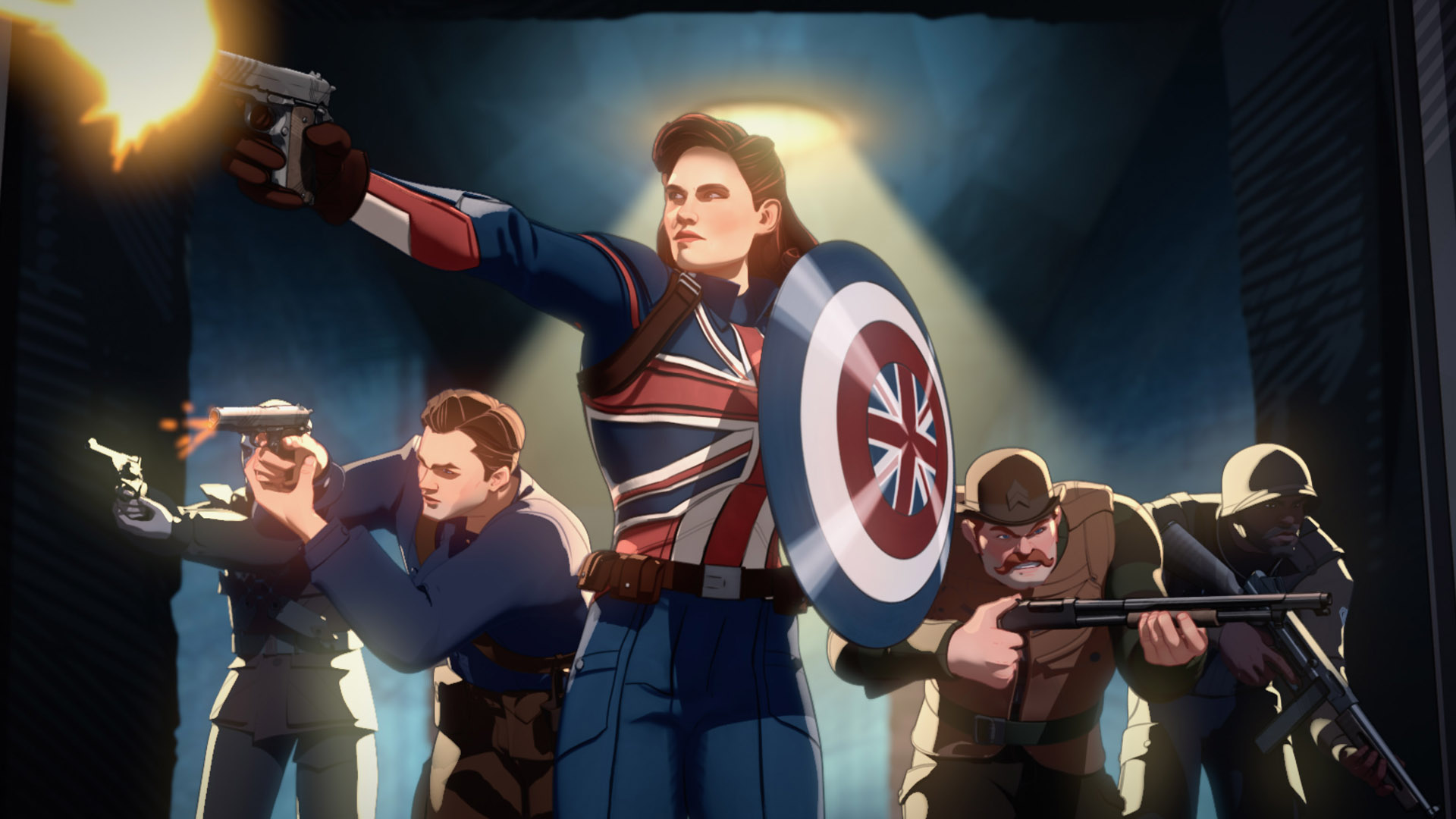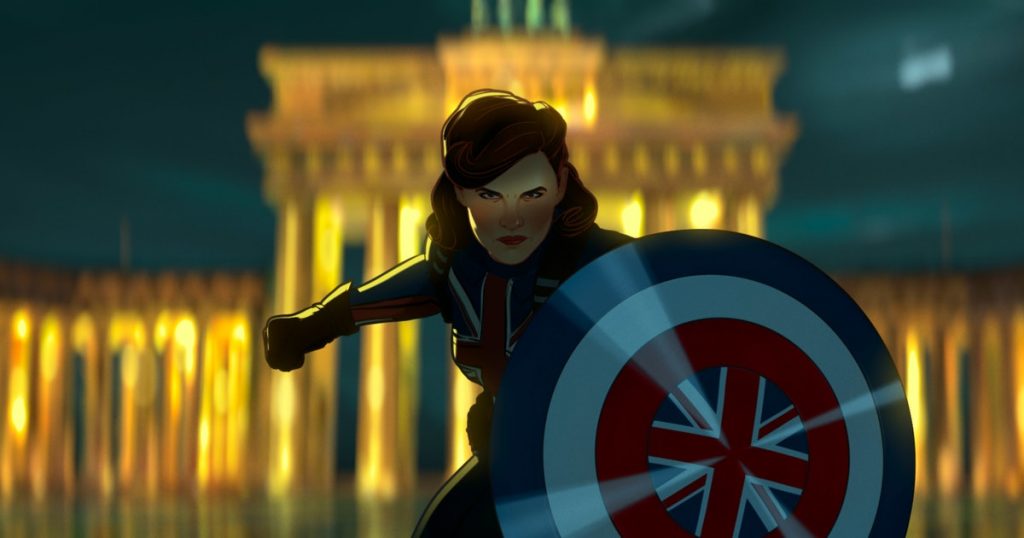
There’s perhaps more promise in a Marvel anthology saga that it feels more suitable for playing with the Marvel Cinematic Universe rather than adhering to its many connections. The previous Marvel series of Loki almost seemed to break that connective tissue to allow for a splintering of worlds to explore. This framing isn’t a necessary requirement for diving into Marvel’s What If…? and that’s also part of its charm, where anything can happen. The problem is that jumping into such a series seems as though it requires a hefty dose of MCU lore-loving to fully engage with all its wild revisionism.
Hosted by the mysterious and omnipresent figure of The Watcher (Jeffrey Wright), different dimensions are observed where key events of the Marvel timeline are altered. Remember how Steve Rogers received the Super-Soldier serum that transformed him into Captain America? Watch how an altercation with the operation leads to Agent Peggy Carter (Hayley Atwell) receiving the serum and becoming Captain Carter, wielding a Vibranium shield with the British flag.
Remember how Peter Quill was abducted by aliens that led to him becoming a Guardian of the Galaxy? A different dimension now has T’Challa (the late Chadwick Boseman) taking his Wakandan taking on the mantle of Starlord, leaving behind the title of Black Panther.
These first few episodes, however, just feel like little more than a character swap. Sure, it’s fun to see Carter become the beefed-up spy that takes down Red Skull but the story more or less plays out the way one would expect with surface-level subversion. A different dynamic is created with Steve Rogers and Peggy which is unique but rarely explored.
The defining moment of Peggy performing her ultimate act of courage really only differs from Captain America: The First Avenger in terms of their being a different sort of monster for her to best. There’s also a whole lot of winking about near-misses and winking roasts of the MCU. Good thing Bucky Barnes didn’t take a tumble off that train, right? Who knows what would’ve happened to him.
The same problems occur with a T’Challa Starlord though for different reasons. His episode has a lot of familiar Guardians of the Galaxy scenes but thankfully a different story dynamic. Familiar enemies are now misfit allies and seemingly low-level threats are now incredibly dangerous.
At its core, however, it just feels like a standard Guardians of the Galaxy story, posed as more of a decent pilot for a series of intergalactic capers. There’s a whole lot more winking in this episode as well, even providing an uncomfortably mild conversation about a universal genocide that was averted.
It’s only by the third episode where there’s a more enthralling appeal to these revisions. Finally, the show stops with the ideas of cosplay swap and instead takes a wilder stab at revisionism. The Avengers initiative storyline of Phase 1 is transformed from a gathering of heroes to a murder mystery. This is by far the most interesting episode but it’s also the one that requires the most foreknowledge of the entire MCU.
The murder-mystery angle is stellar, especially with how it balances so many familiar characters, but the grand reveal is only going to be surprising for those less engaged with the lengthy timeline of the MCU. It’s a great use of the timeline, sure, but there’s certainly going to be someone asking just who is this mysterious character behind these murders, considering there is no introduction given.
The cel-shaded computer animation has a solid look, where the abundance of color and shadows never overwhelm with too many interactions. That being said, it’s also stiff at times where characters feel more dead-eyed than they should. The look is okay for television animation but I can’t help but feel an MCU animated TV series, paired alongside the stellar production design of WandaVision and Loki, should have a more refined appeal.
One aspect of the show that’s pretty brilliant is the atmosphere for each episode. Carter’s adventure feels retro and rousing with the circle transitions, soundtrack, and dramatic staging. T’Challa’s heist operation is slickly portrayed with planning and bickering among misfits. Even the murder-mystery episode has its own level of thriller-style staging that makes it all the more compelling.
There’s also a lot of questionable elements at trying to insert some levity into the characters. This is most present in the murder-mystery episode, where Agent Coulsen makes surprisingly poor-timed jokes about Thor’s hair and scent. Perhaps if the episode were better framed as a dark comedy, I could buy such statements but this is sadly not the case.
What If has a lot of potential but these opening episodes really feel as though they are squandering a golden opportunity to explore so much more. Hopefully, there’s more to this series than just a new series of cosplay variants because this show really only seems to be at its height when retooling stories rather than retooling the roles.

 “My Spy: The Eternal City” Review
“My Spy: The Eternal City” Review  “Deadpool & Wolverine” Review
“Deadpool & Wolverine” Review  “The Boys: Season Four” Review
“The Boys: Season Four” Review  “The American Society of Magical Negroes” Review
“The American Society of Magical Negroes” Review  “Twisters” Review
“Twisters” Review  “Sausage Party: Foodtopia” Review
“Sausage Party: Foodtopia” Review  “Robot Dreams” Review
“Robot Dreams” Review  “Godzilla x Kong: The New Empire” Review
“Godzilla x Kong: The New Empire” Review 



